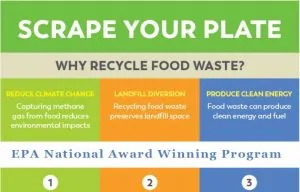

Los Angeles County Public Works – Environmental Programs Division is receiving a 2019 Food Recovery Challenge Award from the United States Environmental Protection Agency – USEPA this year. The national recognition is for the County’s substantial increase in food recovery and sustainable materials management. EPA’s data-driven awards are based on the information submitted in the Sustainable Materials Management – SMM, Data Management System, and reflect percent changes comparing an organization’s data to the previous year’s data.
LA County Public Works serves 88 cities and a population of more than 10 million people. The County is continually pursuing ways to make its communities more resilient by identifying new SMM actions to address greenhouse gases, waste generation, and pollution.

Public Works, in collaboration with the Sanitation Districts, made use of the existing anaerobic digestion infrastructure to convert 13,700 pounds of food waste to electricity. Worm composting bins divert an additional 1,200 pounds of food waste and another 340 pounds were source reduced by improved planning by kitchen staff. All of these diversion tactics reduce greenhouse gas emissions.
Getting employees and visitors to separate food waste properly is always a challenge. The project team, including SCS Engineers, significantly reduced cross-contamination by increasing on-site signage and peer-to-peer outreach. Signage, easily updated with user-friendly graphics makes a difference. The team further encourages new social behaviors with an educational video.
Despite the closing of recycling programs in other cities due to the pandemic, LA County Public Works is now expanding its program to recycle other types of organic waste, including food-soiled paper.
Preventing and reducing food waste has a tremendous impact and positive benefits for our nation. Food is a valuable resource. Efforts to reduce food waste and ensure excess food doesn’t go to waste are needed now more than ever. Participants in EPA’s Food Recovery Challenge in 2019 prevented or diverted over 815,000 tons of food from entering landfills or incinerators, saving participants up to $42.3 million in avoided landfill tipping fees. The EPA provides many helpful tools on its website.
Learn more about SCS Engineers’ Sustainable Materials Management and Composting programs at SCSEngineers.com.